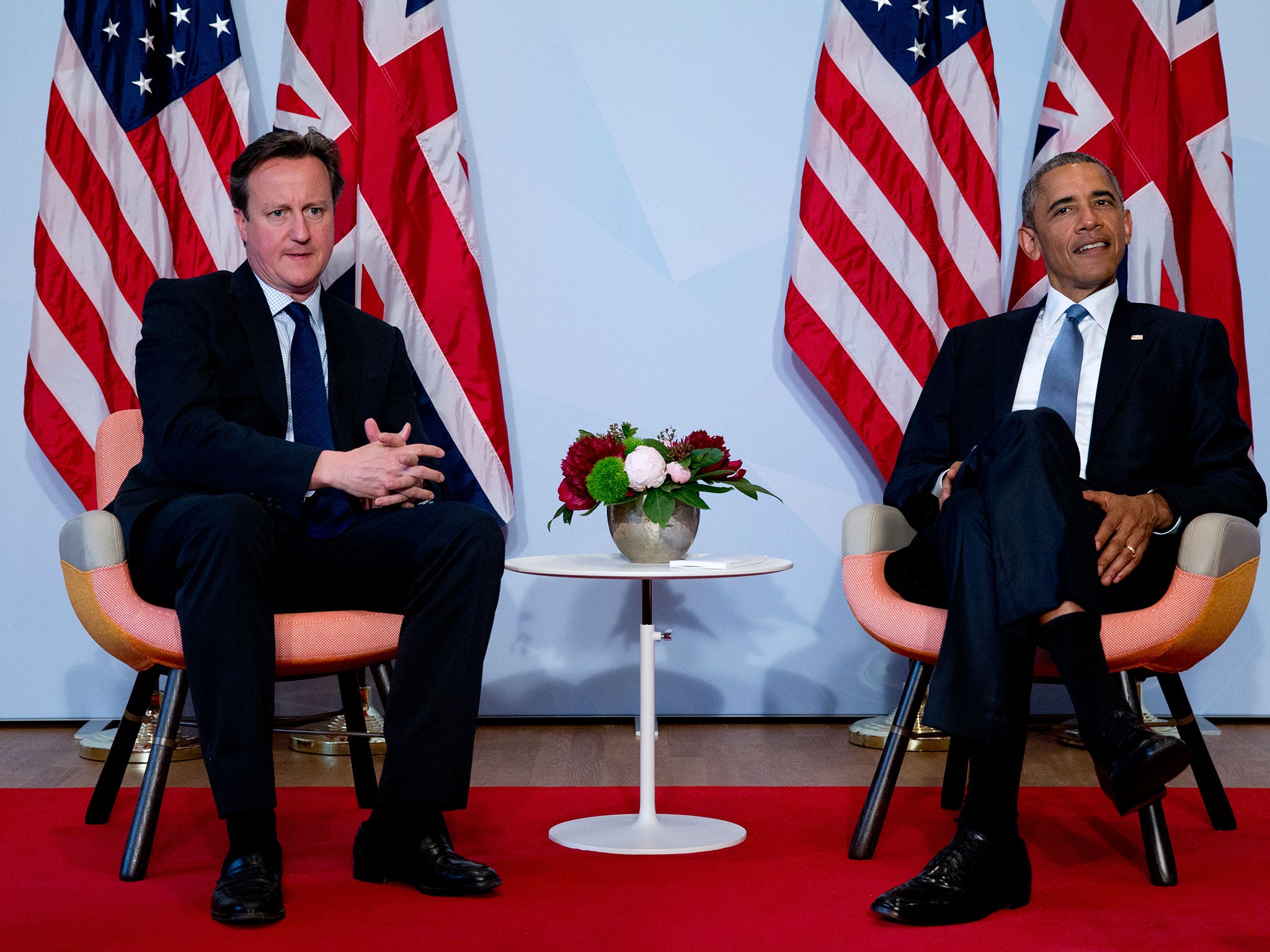David Cameron warns President Obama he cannot promise to maintain defence spending
Cameron told Mr Obama he cannot not give guarantees that defence spending will not fall following the autumn spending review

David Cameron has warned President Obama that he can no longer promise the Government will keep its commitment to maintain Britain's defence budget in the face of further austerity.
The American President used a bilateral meeting with Mr Cameron at the fringes of the G7 to request that the UK continues to spend at least two per cent of GDP on defence over the next five years.
But in response that will infuriate the American administration Mr Cameron pointedly told Mr Obama that he cannot not give guarantees that defence spending will not fall significantly following the Government's spending review in the autumn.
His position is in stark contrast from that of a year ago when he joined with Mr Obama at the Nato summit in Wales to call on other countries who were not spending at least two per cent of national income on defence to "urgently take steps" to meet it. It raises the likelihood that defence spending will be one of the big losers when departmental spending limits are announced later this year.
Downing Street confirmed that President Obama used the meeting to raise the issue of two per cent and reiterate that as a "key" member of Nato the Americans expected to Britain to stick to its commitment.
But a source said Mr Cameron made clear that no such concession would be forthcoming and that defence might have to be cut as part of the Autumn spending review.
Asked about this issue earlier in the day Mr Cameron told journalists at the summit: "I will say (to President Obama) exactly the same as I'm saying now which is we're having a spending review in the autumn and we'll announce the results at that time," he told journalists ahead of the meeting.
He added that so far Britain had "kept our two per cent promise" adding "we are one of the few countries to do it."
American Government sources have expressed frustration that despite private, and latterly public, pressure they have had no commitment or indication at all from London that the two per cent target will be maintained.
Last week the American Defence Secretary said he feared the UK could become "disengaged" if it makes further cuts.
Ashton Carter said Britain had "always punched above its weight" and "it would be a great loss to the world if it now took action that would indicate disengagement".
Downing Street categorically deny this and point out the the UK is the second largest contributor to the campaign against Isis in Syria as well as commitments to Nato in Europe.
To reinforce that Mr Cameron announced that up to 125 extra British army personnel will be sent to Iraq to provide training to Iraqi security forces.
The extra troops, who will be based in several locations, take to just under 1,000 the number of British forces involved in the Iraqi mission.
In another attempt to reassure the Americans that Britain remains determined to play its role in Nato's collective defence the Foreign Secretary Philip Hammond suggested that Britain could host American cruise missiles amid heightened tensions with Russia.
Mr Hammond said there were "worrying signs" about the increased activity of Russian forces and the UK would consider the pros and cons of taking US intermediate-range weapons.
But he added that Britain and its Nato allies needed to be careful not to cause "unnecessary provocation" against Russia, which has a "sense of being surrounded and under attack".
The Pentagon is looking at axing a Cold War-era treaty and deploying nuclear-capable missiles in Europe in response to Russia's breaches of international law, according to reports earlier this week.
Asked if he would back plans to re-introduce US missiles to Europe, Mr Hammond said: "I would need to see the detailed case for that.
Pressed on whether that would be a way to send a message to the Russian president, he replied: "It could be, but I think we have got a very delicate act to perform here."
Asked if American missiles could be based in Britain, he said: "We would look at the case. We work extremely closely with the Americans. That would be a decision that we would make together if that proposition was on the table. We would look at all the pros and the cons and come to a conclusion."
The G7 Summit is also expected to discuss the situation in Ukraine ahead of a meeting of EU leaders later this month which will decide whether to renew sanctions against Moscow.
Any renewal requires unanimity amongst all 28 EU leaders and there are concerns that Russia is attempting to 'pick off' some smaller countries in an attempt to get them to vote against renewal.
Mr Cameron and President Obama will attempt to get an united line at the G7 in favour of continued sanction - even among those countries in Eastern Europe whose economies have suffered as a result of Russian food import bans.
"Europe has been united," Mr Cameron said.
"Britain has played quite a role in bringing that unity together and having a strong response and I think we need to make sure that Europe remains united.
"Sanctions have an impact on all countries. Britain has not let our preeminence in financial services get in the way of a robust response to Russian backed aggression and I don't think other countries should either."
Subscribe to Independent Premium to bookmark this article
Want to bookmark your favourite articles and stories to read or reference later? Start your Independent Premium subscription today.

Join our commenting forum
Join thought-provoking conversations, follow other Independent readers and see their replies